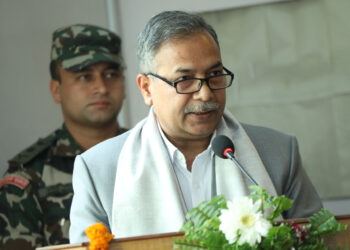With the fragile moves and skeptic attitude of the ruling Nepal Communist Party (NCP), the looming threat over an opportunity to cash a massive grant under Millennium Challenge Corporation (MCC) has put the two-year-old pact that Nepal signed with the United States (US) at stake.
The sublime aspect of democracy is in the free-play of thoughts and opinion, hence democracy nurtures and values open discussion and transparency.
However, the discussion held for deliberate delay at the implementation of the impacting agenda, that also as a means of gaining short-term political bargain or power-deals, may turn regrettable.
The MCC deserves formal mandate as it is as per the will of the people, has no harm to anyone, is not part of any military mission, and is in the best interest of Nepal and its people.
The skeptic attitude of the political leadership and especially the government’s lack of timely initiative seem to be menacing the economic opportunity of self-reliance. The US government and the mission here in Nepal have repeatedly made it clear that MCC is not a military scheme or part of military strategy.
The dispute in the ruling party smells foul as they seem committed to link Indo-Pacific strategy with military strategy and cite the same to discard this all tempting project Nepal can use for strong infrastructure building.
Now, just crawling out from darkness Nepal has a high potential for power export. Ordinary life is crippled badly by poor road structure. At a time when the nation is all focused on paving room for self-reliance infrastructure building, MCC has to get the priority.
In this context, MCC’s consideration to incorporate Nepal in it came like a promising winter sun.
MCC was long sought by the Nepal government and was one of the programs signed by Gyanendra Bahadur Karki, then Finance Minister during the Sher Bahadur Deuba-led government in 2016.
Pradeep Gyawali, the Minister for Foreign Affairs of the incumbent ‘two-thirds majority government’, in his visit to the USA had met his counterpart and others to assure the government’s backing up the agreement signed by the former government.
The government has to consider the attempts to weaken the 70-year-old foundation of Nepal-US relations as the attempts to portrait mega grant as the one ‘designed and imposed by the US’ are likely smear the friendly relations and depict poor diplomacy from Nepal’s side.
Various forces like the ‘interest groups’ who enjoy playing their power games in Nepal, the lack of proper coordination between various mechanisms established at the ministry, lack of sufficient homework can be held accountable for the mess.
Tabled in parliament on 16 July 2019, the agreement which had already got ‘go-ahead’ from the Ministry of Finance was, most likely, at the provocation of some forces was kept aside from the discussion.
Earlier, the high officials from the government had assured the US government that it would endorse the bill by October, unfortunately, the session came to an end without discussing the agenda.
The skeptic attitude of the political leadership and especially the government’s lack of timely initiative seem to be menacing the economic opportunity of self-reliance. The US government and the mission here in Nepal have repeatedly made it clear that MCC is not a military scheme or part of military strategy.
A glance at the selection criteria which says that the selection of the deserving country is based on “the country’s overall performance in three broad policy categories: Ruling justly, Encouraging Economic Freedom and Investing in People.”
Provided handled efficiently, the program is sure to address an inadequate supply of electricity and high cost of transportation. It should be noted that the compact of $500 million US grant investment matched by $130 million from the government of Nepal will benefit 23 million Nepalis, nearly 80 percent of the population. As per the plan, $500 million will go to the Energy Sector and $130 million to the roads sector.
Prior to the ‘shaky’ comment, the government had talked about its plans for investing in transmission line extension and road network enhancement.
To recall what Acting MCC CEO Jonathan Nash said during the signing of the $500 million MCC compact with Nepal, both the countries ‘celebrate a new chapter in the US-Nepal partnership’ and that the compact was ‘basically designed to spur economic growth and private investment, as well as open new markets to benefit the economy, regional security and the broader global community’.
As Nepal continues to undergo economic development challenges due to decades of political transition, high transportation costs, arduous labor relations, among others, MCC compact can be a clear demonstration of the relationship between Nepal and the United States of America.
In fact, an economically vibrant and stable Nepal would help promote regional security and stability.
Read Below, Millennium Challenge Compact [Full Text]









Comment